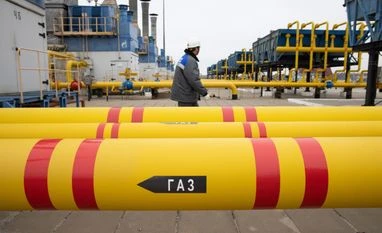The G7 leaders on Saturday agreed to stronger language on short-term gas investments in the context of Russia's ongoing war against Ukraine and the resulting energy crisis.
"We stress the important role that increased deliveries of LNG can play, and acknowledge that investment in the sector can be appropriate in response to the current crisis and to address potential gas market shortfalls provoked by the crisis," reads the text.
The text makes clear these investments must be limited to "the exceptional circumstance" given the Russian-driven energy shock and "as a temporary response."
Still, the green light to invest in more gas clearly runs against calls from the Intergovernmental Panel on Climate Change (IPCC) and the International Energy Agency (IEA) to stop new investments in fossil fuel production, and is likely due to intense lobbying from German Chancellor Olaf Scholz in the past week.
The G7 leaders also reiterated their joint commitment to 60 per cent greenhouse gas (GHG) cuts by 2035 and emission-free power grids in just over 10 years and highlighting plans to "accelerate the phase-out of unabated fossil fuels so as to achieve net zero in energy systems by 2050 at the latest in line with the trajectories required to limit global average temperatures to 1.5 degrees Celsius".
Also the G7 leaders backed the commitment from their energy and climate ministers earlier in the year to rapidly hike investments in clean energy.
More From This Section
"The G7 contributes to expanding renewable energy globally and bringing down costs by strengthening capacity including through a collective increase in offshore wind capacity of 150GW by 2030 based on each country's existing targets and a collective increase of solar PV to more than 1TW by 2030 estimated by the IEA and the International Renewable Energy Agency (IRENA) through means such as each country's existing targets or policy measures."
However, the G7 leaders did not endorse Japan's efforts to promote coal and ammonia co-firing of coal in the communique. G7 leaders see the use of renewable hydrogen or ammonia (co-firing with coal) in the power sector as reasonable only if it can be aligned with a 1.5 degrees pathway.
It is a challenging sign for Japan as IEA's 1.5 scenario sets a pathway that advanced economies need to phase out unabated coal power by 2030.
The leaders did offer more detail on their Clean Energy Economy Action Plan which the White House offers.
The communique says the G7 will "create trade policies that decarbonize our economies, accelerate the development of resilient clean energy supply chains, grow shared markets for clean energy goods and services, and mobilise significant public and private sector climate and energy security investments".
Responding to the developments, Luca Bergamaschi, co-director, ECCO, said: "G7 leaders recognise the world needs to rapidly end its dependency on fossil fuels by massively scaling up solar and wind, achieving decarbonised power systems by 2035, energy savings and gas demand reduction.
"The temporary endorsement of public investment in gas is incomprehensible when the gas industry has made hundreds of billions in profit whilst G7 governments have had to subsidise their people's bills.
"This is a major contradiction that will unnecessarily pressure already stretched public budgets and further fill the coffers of the gas industry."
Friederike Rader, Vice-President for global advocacy Global Citizen, said: "This year's G7 communique shows that the group of seven is off track. While the communique reads good on many issues such as the need for further World Bank reform or new debt tools, it misses the mark on what's really needed: action.
"No new concrete commitment has been made by the G7. For example, it is good to see a commitment to finally meeting the $100 billion international climate finance promise in 2023 -- three years late -- but no new pledges have been made to give this promise some credibility."
--IANS
vg/ksk/
)